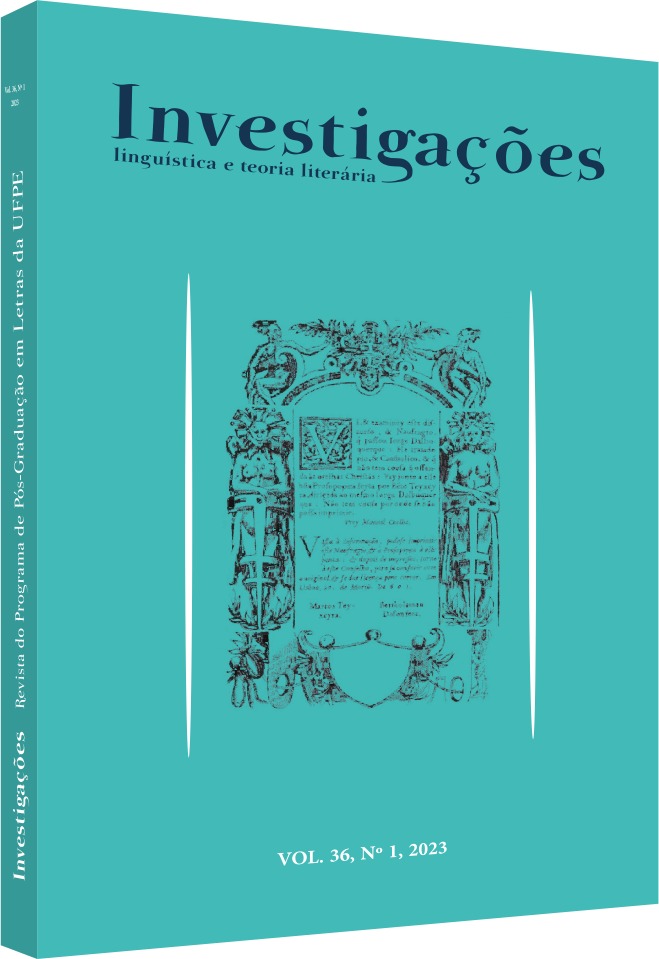Francophone literatures and critical interculturality in FLE class
DOI:
https://doi.org/10.51359/2175-294x.2023.258506Keywords:
literature, francophone, interculturality, didactic, FLEAbstract
This article proposes reflections on the importance of working with francophone literature in FLE classes from an educational-critical practice (FREIRE, 1997), defending an intercultural approach (ABDALLAH-PRETCEILLE, 2018), and taking into account the idea of a critique of interculturality (WALSH, 2009; TUBINO, 2005). The literary text opens up to the subjectivity and to the multiplicity of understanding oneself and the world. From this perspective, in this study, we want to think about the potential of francophone literature, insofar as it is even more open to this multiplicity, by putting a great diversity of cultures in relation (and tension).
References
ABDALLAH-PRETCEILLE, Martine. L’éducation interculturelle. Clamecy : PUF, 2018.
BERTHELOT, Reine. Littératures francophones en classe de FLE : pouquoi et comment les enseigner. Paris : L’Harmattan, 2011.
BLANCHET, Philippe. L'approche interculturelle comme principe didactique et pédagogique structurant dans l'enseignement/apprentissage de la pluralité linguistique. Dans Maria Diaz, Olga, et Blanchet, Philippe (Dir.), Pluralité linguistique et approches interculturelles, revue Synergies Chili n°3, GERFLINT/Institut Franco-Chilien, 2007, p. 21-27, URL : http://gerflint.fr/Base/chili3/blanchet.pdf, page consultée le 09 février 2021.
CONSEIL DE L’EUROPE. Cadre Européen commun de référence pour les langues : apprendre, enseigner, évaluer. CECR : Strasbourg, 2001.
FREIRE, Paulo. Pedagogia da autonomia. São Paulo : Paz e Terra, 1997.
GODARD, Anne. La littérature dans l’enseignement du FLE. Paris : Didier, 2015.
hooks, bell. Ensinando a transgredir : a educação como prática da liberdade. São Paulo : WMF Martins Fontes, 2017.
JOUBERT, Jean-Louis. Enseigner les littératures francophones. Le français dans le monde, janeiro-fevereiro, N. 343, 2006, URL : https://www.fdlm.org/article/343/joubert.php, page consulté le 09 février 2021.
SHOHAT, Ella; STAM, Robert. Crítica da imagem eurocêntrica. São Paulo : Cosac Naify,2006.
TUBINO, Fidel. La interculturalidad crítica como proyecto ético-político. Dans : Encuentro continental de educadores agustinos. Lima, 24-28 de enero de 2005. Disponível em: http://oala.villanova.edu/congresos/educación/limaponen-02.html.
VELDWACHTER, Nadège. « Littérature française et littératures francophones : une union inconvenante ? », Fabula-LhT, n° 8, « Le Partage des disciplines », mai 2011, URL : http://www.fabula.org/lht/8/veldwachter.html, page consultée le 09 février 2021.
WALSH, Catherine. Interculturalidad y Educación Intercultural. Seminário organizado por el Instituto Internacional de Integración del Convenio Andrés Bello, La Paz, 9-11 de marzo de 2009.
WALSH, Catherine. Pedagogías decoloniales: Prácticas insurgentes de resistir, (re)existir y (re)vivir. Tomo 1. Quito : Abya Yala, 2013.
Downloads
Published
How to Cite
Issue
Section
License
Copyright (c) 2023 Catarina Andrade

This work is licensed under a Creative Commons Attribution 4.0 International License.
Authors who publish with Revista Investigações agree to the following terms:
Authors retain copyright and grant the journal right of first publication with the work simultaneously licensed under the Creative Commons Attribution 4.0 International (CC BY 4.0) license that allows others to share the work with an acknowledgement of the work's authorship and initial publication in this journal.
Authors are able to enter into separate, additional contractual arrangements for the non-exclusive distribution of the journal's published version of the work (e.g., post it to an institutional repository or publish it in a book), with an acknowledgement of its initial publication in this journal.
You are free to:
Share — copy and redistribute the material in any medium or format for any purpose, even commercially.
Adapt — remix, transform, and build upon the material for any purpose, even commercially.
The licensor cannot revoke these freedoms as long as you follow the license terms.
Under the following terms:
Attribution — You must give appropriate credit , provide a link to the license, and indicate if changes were made . You may do so in any reasonable manner, but not in any way that suggests the licensor endorses you or your use.
No additional restrictions — You may not apply legal terms or technological measures that legally restrict others from doing anything the license permits.

